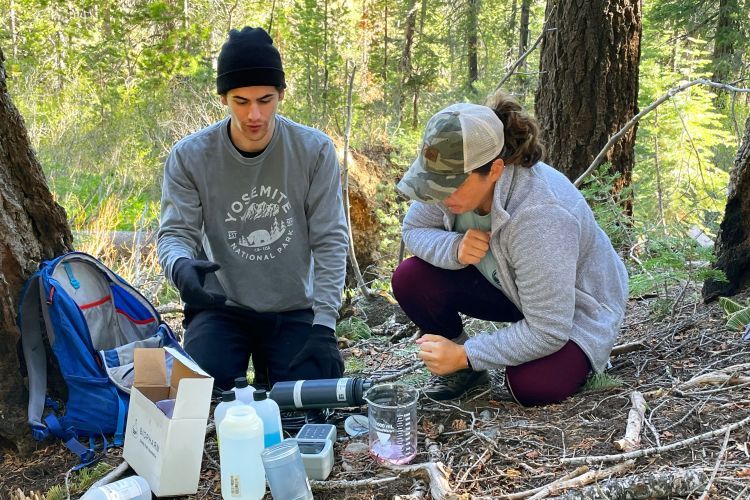Breadcrumb
Geology professor and students’ research could reveal clues to climate change

Undergraduates Jackson Morgan ’24 and Jenny Dagnino ’23 collected water samples during a trip to Sagehen Experimental Forest in June.
Geology professor Laura Rademacher is using a $355,000 grant from the National Science Foundation to explore the impacts of climate change on one of California’s most vital resources—water. The grant is a significant investment in her ongoing research.
The two-year project is exploring how climate change impacts mountain groundwater systems and the ecosystems they support by studying springs in the Sierra Nevada.
“In the Central Valley we get a lot of our water from the Sierra Nevada, so understanding how climate change is going to affect those water resources in the future is important,” Rademacher explained.
Mountains provide a stable water supply for agricultural activities, nearby cities and threatened ecological communities.
“You can think of the mountains as water towers,” said Zach Meyers, a postdoctoral researcher working on the project. “The snowpack in the mountains is what feeds the rivers and reservoirs.”
The research, which began in February, is being conducted at Sagehen Experimental Forest near Truckee, California. The site has been monitored as part of various research projects for decades, making it an ideal location to compare previous samples with current findings.
“The springs have started to show signs of collapse,” said Meyers. “They are flowing less; they are getting a little bit warmer, so we are looking at how these springs have changed over the last 30 years.”
Rademacher wants to see if the springs are continuing to evolve in the same way, and if so, how that is affecting the surrounding ecology. “The most important thing is understanding how the changing climate is going to impact our water resources and the organisms that are supported by them.”
Two students are getting hands-on experience as part of the research team. Undergraduates Jackson Morgan ’24 and Jenny Dagnino ’23 are working alongside Rademacher, Meyers and John Umek, an aquatic ecologist at the Desert Research Institute in Reno.
“We can only learn so much from class lectures, so these opportunities give us the experience to be well-rounded in our fields of study and for our future careers,” Dagnino said.
The team has collected samples from 14 springs this summer and will collect more over the next two years.
Along with field research, Rademacher’s team will create a spring ecology-themed “green box,” in collaboration with the Desert Research Institute as part of a grant requirement for the research to have broader impact. The self-contained teaching kits will be available for K-12 educators.
Pacific students will also get to see the team’s work up close. Rademacher’s Critical Zone Science class will visit the site next year. The class is an interdisciplinary approach to studying areas of the Earth that provide essential services to people, such as water and food.
“Instead of having a chemistry class or a geology class, all of those things come together in this one class, and the study site is a great place to think about critical zone processes,” Rademacher said.
“This research has the potential to be really impactful,” Meyers said. “There is a lot of interest in the work that we are doing here because the site is important with the long record there. We are really seeing how the basin is changing.”




